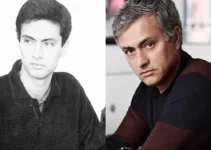The Spanish football manager, a celebrated native of Haro in the La Rioja province of northern Spain, is the proud son of Berta Castillo and Alberto de la Fuente Sr. Raised by his father, a renowned merchant marine engineer, and his mother, who ran a haberdashery in Plaza de la Paz, Luis de la Fuente grew up with a strong work ethic and deep-rooted values.
Beyond his strategic football management career, Luis is a man whose passion and lifestyle inspire many, including his family members who follow in his footsteps. Despite his limited presence on social media, he has commanded widespread respect and admiration. His composure and resilience have enabled him to withstand unnecessary pressure throughout his career. This article delves not only into his professional journey but also provides a deep insight into his sports-loving family background.
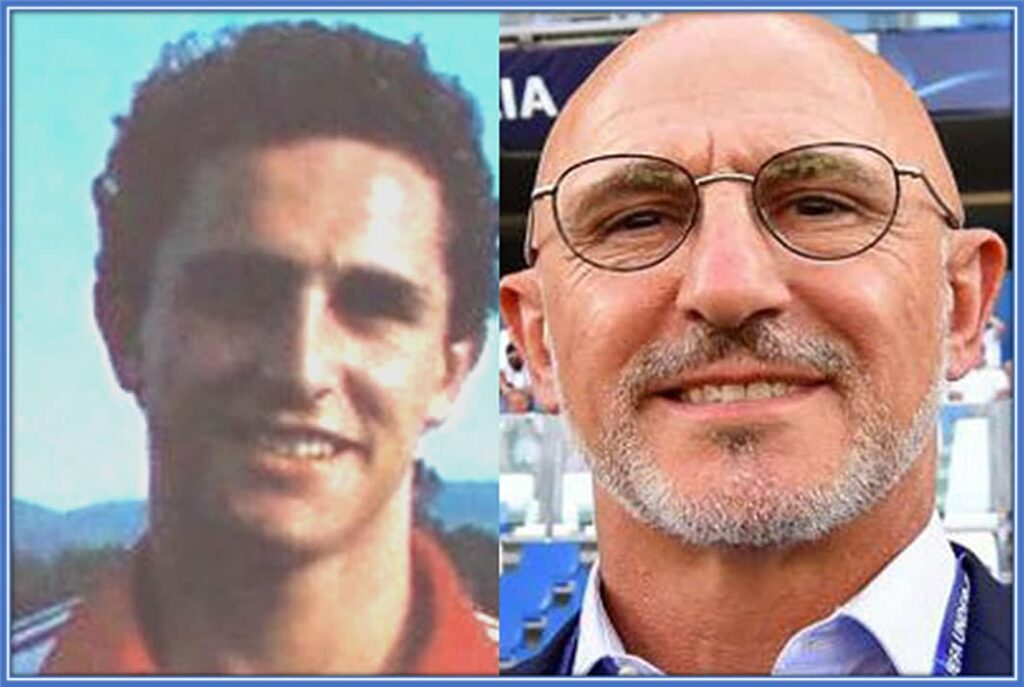
Luis de la Fuente: From Haro’s Roots to Football Management Excellence
Embark on a journey through the life of Luis de la Fuente, a narrative that transcends football. From his humble beginnings to the heights of his career, every chapter unveils a testament to resilience.
Meet the pillars of his life – his parents Berta Castillo and Alberto de la Fuente Senior, his sister Ana de la Fuente, and his beloved son Alberto de la Fuente. Explore the tapestry of his family, from grandparents to cousins, and the values they instilled.
Beyond the pitch, delve into the intricacies of his identity – his religion, his education, and the essence of his hometown. Join us as we celebrate the man behind the manager, revealing the layers of Luis de la Fuente’s life, his aspirations, and the legacy he’s building.
Preamble:
Our portrayal of Luis de la Fuente’s biography starts by revealing significant events from his childhood. Next, we’ll explain his ethnic heritage and early career highlights. Finally, we’ll tell about how the football coach and former professional player earned a sporadic rise in the beautiful foot game.
We hope to whetting your autobiography appetite as you read Luis de la Fuente’s Bio. To do that, let’s present you with this photo gallery summarising the sports competitor’s life story. Behold Luis’s journey from his early soccer days to his rise as a well-known figure in the world of football.
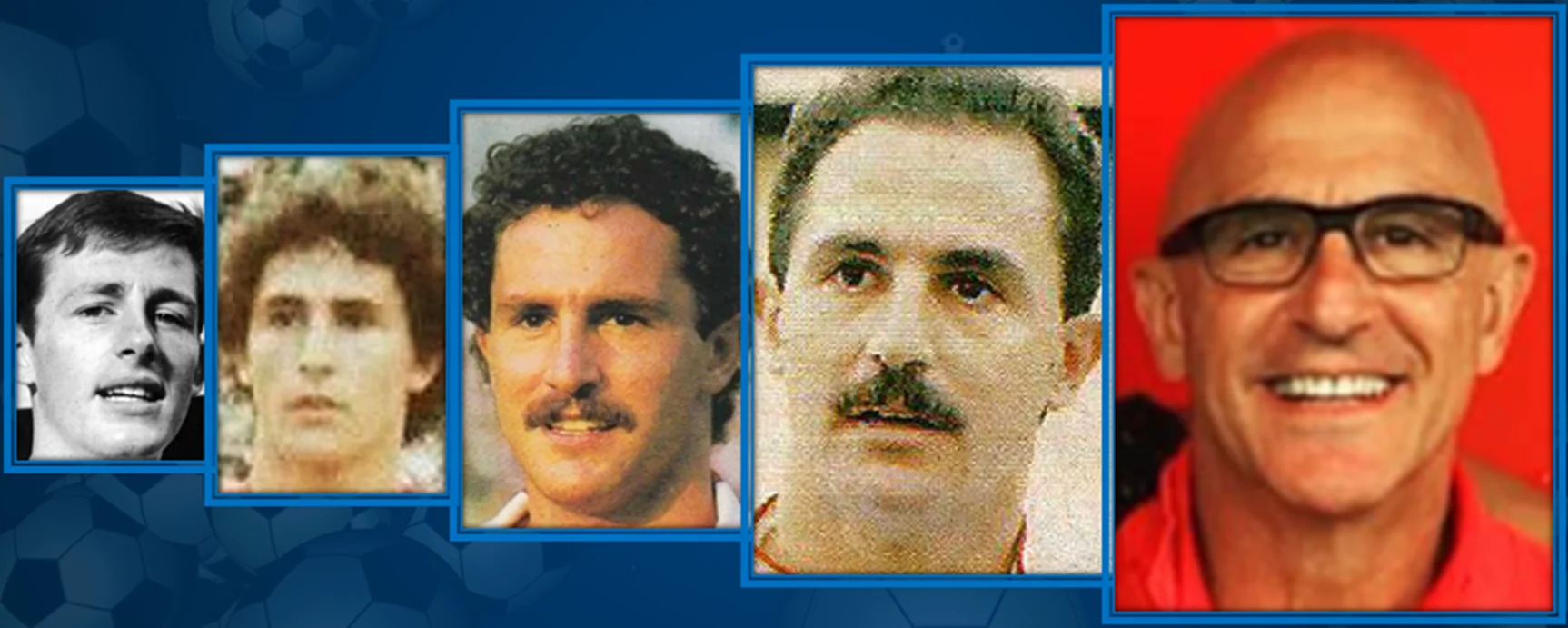
Luis de la Fuente Biography – A pictorial trajectory of Luis de la Fuente from early days to the moment he became famous. Sources: Celebsagewiki, Bdfutbol , RTVE, RTVE, Instagram/luisdelaafuente/.
The over-60-year-old coach, who has been a football manager for over 26 years, is widely known for his performance in leading Spain’s Olympic team to the silver medal at the 2020 games. After this, he also led the senior team to win the 2023 UEFA Nations League.
In our history of telling the stories of Football Managers, we found areas that haven’t been covered. As such, only a few football lovers have an in-depth version of Luis de la Fuente’s enthralling Biography. Now, without further ado, let’s proceed.
Luis de la Fuente’s Childhood Story:
For Biography starters, without a renowned nickname, the versatile football manager bears the full name, Luis de la Fuente Castillo.
He was born on the 21st day of June 1961 to his Mother (Berta Castillo) and Father (Alberto de la Fuente Senior) in Haro, a town northwest of La Rioja province in northern Spain.
His birth occurred precisely on a warm and welcoming Wednesday marked by the Cancer zodiac sign. Although we are still determining the number of siblings he has, the football boss has a sister, Ana de la Fuente.
Apparently, Luis de la Fuente is the product of the blissful union of his dad and mum, whose continual push and hard work saw to it that the full potential of their Son (now a Football Manager) came to fruition. Now, let’s take a look at his childhood days.
Growing-Up:
Within a close-knit community, Luis grew up with his dad, Alberto and mum, who is often called ‘la Berti.’ Luis de la Fuente’s upbringing got shaped by his familial influences in Haro, a town known for its vineyards in La Rioja, Spain.
Thus, his birth town has a strong winemaking tradition and a relatively small population of over 11,000 residents. As such, many families would have gotten involved in agricultural work, such as grape harvesting. Rural life and farming are a common way of life.
Comparatively, unlike today’s digital age, entertainment options in Haro, as at the time of Luis’s birth and growing up, would have been limited. As such, Children would spend more time playing outside, engaging in simple games, and socializing with neighbours and family.
Haro offered opportunities for outdoor activities, including hiking, cycling, and enjoying the picturesque landscapes of the region. Local festivals and events, such as Semana Santa (Holy Week), are integral to the town’s recreational and cultural life.
Remarkably, as a kid, he had a calm and discreet disposition. Thus, he portrayed a rich inner life that may have developed a strong imagination, creativity, and the ability to reflect deeply on thoughts and feelings.
Growing up in Haro, Spain, Luis de la Fuente was deeply influenced by his family and the vibrant Spanish culture. His close relationship with his father was a big part of his childhood. Consequently, they enjoyed playing games together.
These early experiences played a significant role in shaping Luis de la Fuente’s personality and his lifelong dedication to his passion.
Luis de la Fuente’s Early Life (Football):
Castillo grew up in a Sports-loving family. His upbringing got shaped by his familial influences and a deep-rooted love for soccer. His Dad had a flair for the soccer game among other household members.
As a child, Luis played football on the streets and in local parks with his friends. He was talented from a young age, so it became necessary to join a local youth football club.
Apparently, Luis’s father, Alberto, played a crucial role in shaping his son’s passion for soccer. As a merchant marine, Alberto shared his love for the sport and often took Luis to Bilbao to watch and support Athletic Bilbao.
These early experiences attending matches with his father laid the foundation for Luis’s lifelong commitment to soccer. Spontaneously, the football talent’s dedication to the sport was evident as he progressed through in age. The rest, they say, is history.
Luis de la Fuente Family Background:
At the time of the Soccer Boss’ birth was a period of economic hardship in Spain. Many households struggled with limited economic opportunities, so it was common for parents and children to work to make ends meet.
Howbeit, Luis’s father, Alberto, was a merchant marine. Meanwhile, his mother, Berta Castillo, ran a haberdashery in Plaza de la Paz, representing the family’s connection to local commerce. She sold men’s clothing, including suits, shirts, and neckties as a retailer.
Subsequently, his sister Ana de la Fuente would continue the family business, gradually transforming it into a boutique. His family’s presence in Haro became well-established. Thus, Luis had a close and supportive family environment during his formative years.
Money was not a problem as the household had enough to care for its essential needs of food, clothing and shelter.
Luis de la Fuente Family Origin:
We trace his household ancestry to Spain, in his birthplace, Haro, a town in northern Spain, in the La Rioja region. Notably, his birth town was also the first settlement in Spain to use electricity for outdoor lighting.
According to the tradition of Spaniards, in his Spanish full name, ‘Luis de la Fuente Castillo’, his first name, De la Fuente, is his father’s surname. Meanwhile, his second name, Castillo, is rooted in his mother’s or maternal family name.
As such, implying that his family has a deep background in Spain’s customs, as reflected in his naming pattern.
Imperatively, the former football player and soccer manager, Luis de la Fuente, is European and of Spanish nationality. Following is a picture that explains the cultural heritage of the dazzling Sports enthusiast.
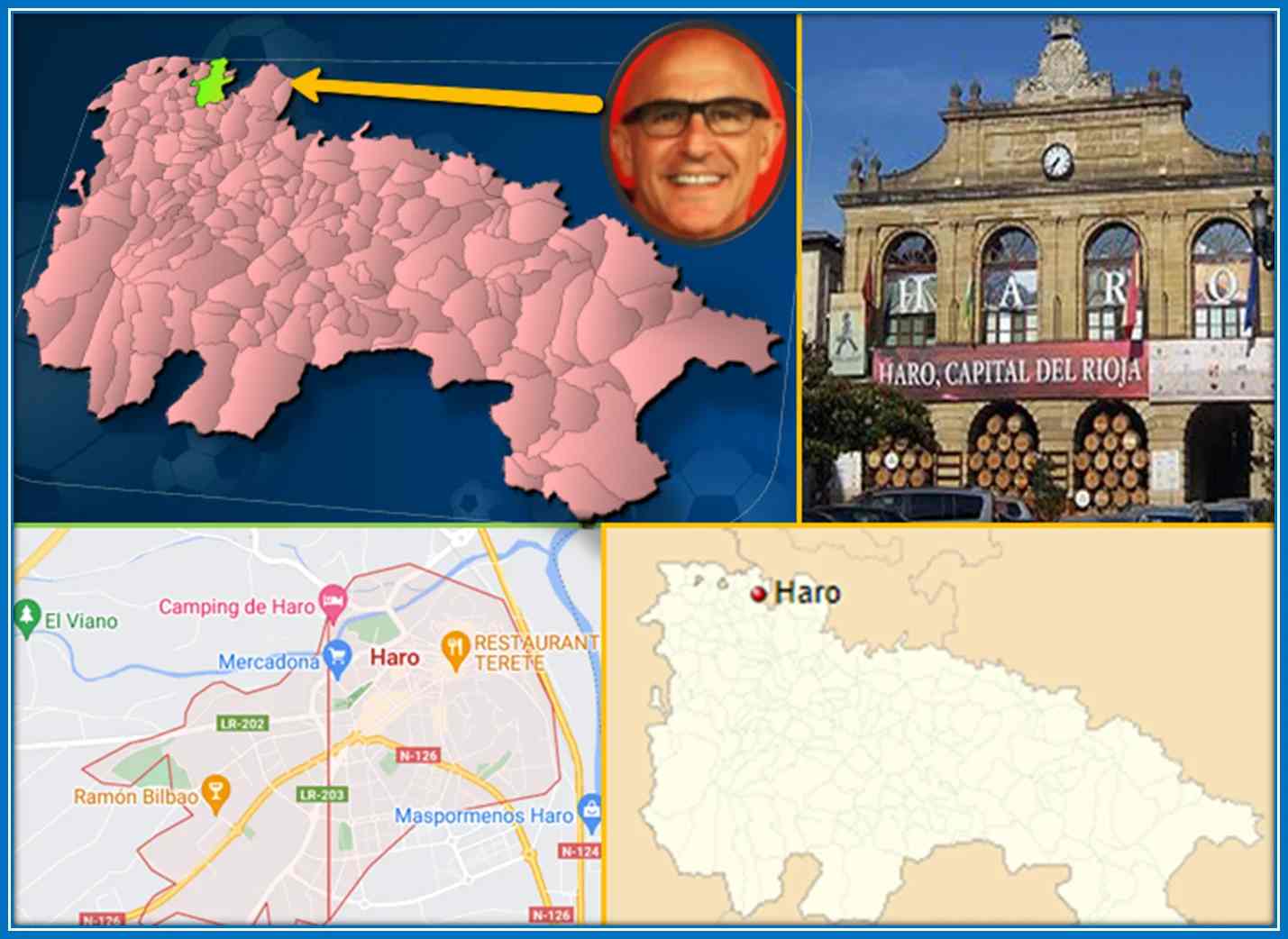
This map aids your understanding of Luis de la Fuente’s origin. Sources: Wikipedia, Google, Instagram/luisdelaafuente/
Luis de la Fuente Ethnicity:
While the majority of the population in Spain identifies as ethnically Spanish and Southern European, there are also significant regional variations and historical influences from other ethnic groups, such as Basque, Catalan, Galician, and more.
However, for one who hails from Haro, Luis de la Fuente is speculatively of the Castilian ethnic group in Northern Spain.
Luis de la Fuente Education:
Schooling was not as widespread or accessible as it is today during the former soccer player’s childhood. Howbeit, many children would have attended local schools. But then, not all of them would have had the opportunity to pursue higher education.
Luis de la Fuente attended the local educational institutions. However, his ardent passion for Soccer meant he had to join a football academy so that he could perfectly combine conventional studies with aggressive football.
Thus, Luis got enrolled in the Athletic Club’s academy, the Lezama school, located in the town of Lezama, about 15 kilometres from Bilbao, in northern Spain.
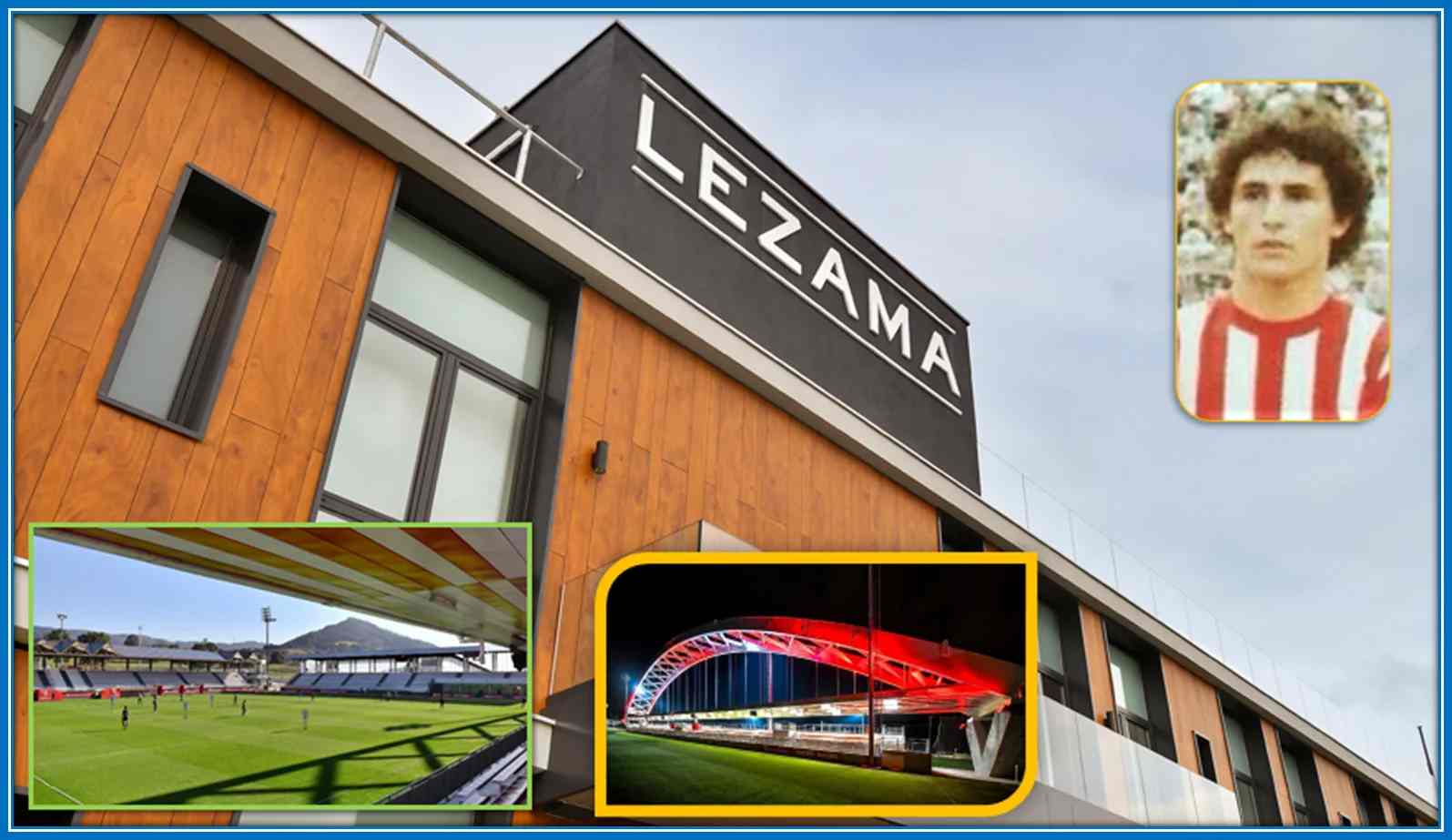
A view of Luis de la Fuente’s football Academy in Lezama. Image Credit: Athletic-club, Bdfutbol.
Career Buildup:
As a young boy, Luis de la Fuente discovered his love for football early on. His father profoundly influenced him throughout his childhood.
The Sports enthusiast, as a teenager, having taken a keen notice of his father’s sporting activities and how deeply engrossed his dad was in football. Thus, Luis also dreamt of becoming a professional player one day.
So, with his dad’s and mum’s backing, he joined the Athletic Bilbao’s youth system. The Club knew that to keep up the progress; it needed a training centre for its professional team and a football academy for its youth sides.
This Youth side of the Club gave Luis a formidable foundation for his soccer career as a footballer and a Soccer Manager. So far, his unwavering commitment to success, influenced by his father’s example, has been a driving force.
These moments set the stage for Luis de la Fuente’s enduring passion and commitment to the world of soccer, a passion he has carried with him throughout his life and career.
Luis de la Fuente Biography – Football Story:
The soccer Boss started his soccer journey with Athletic Bilbao’s youth program. In 1978, he began playing for their reserve team in the Segunda Division B. While there, he took part in the club’s intensive pieces of training and exposition.
Climbing through the ranks, the gamester got his first chance to play for the primary team in La Liga on the 8th of March 1981. He came on as a substitute in a match against Valencia CF, which ended in a draw.
In the summer of 1982, he became officially promoted to the main squad. After this, he debuted as a professional footballer at Athletic Bilbao, playing as a left-back. Luis scored his foremost goal on the 26th of March 1983, helping his team win RC Celta de Vigo.
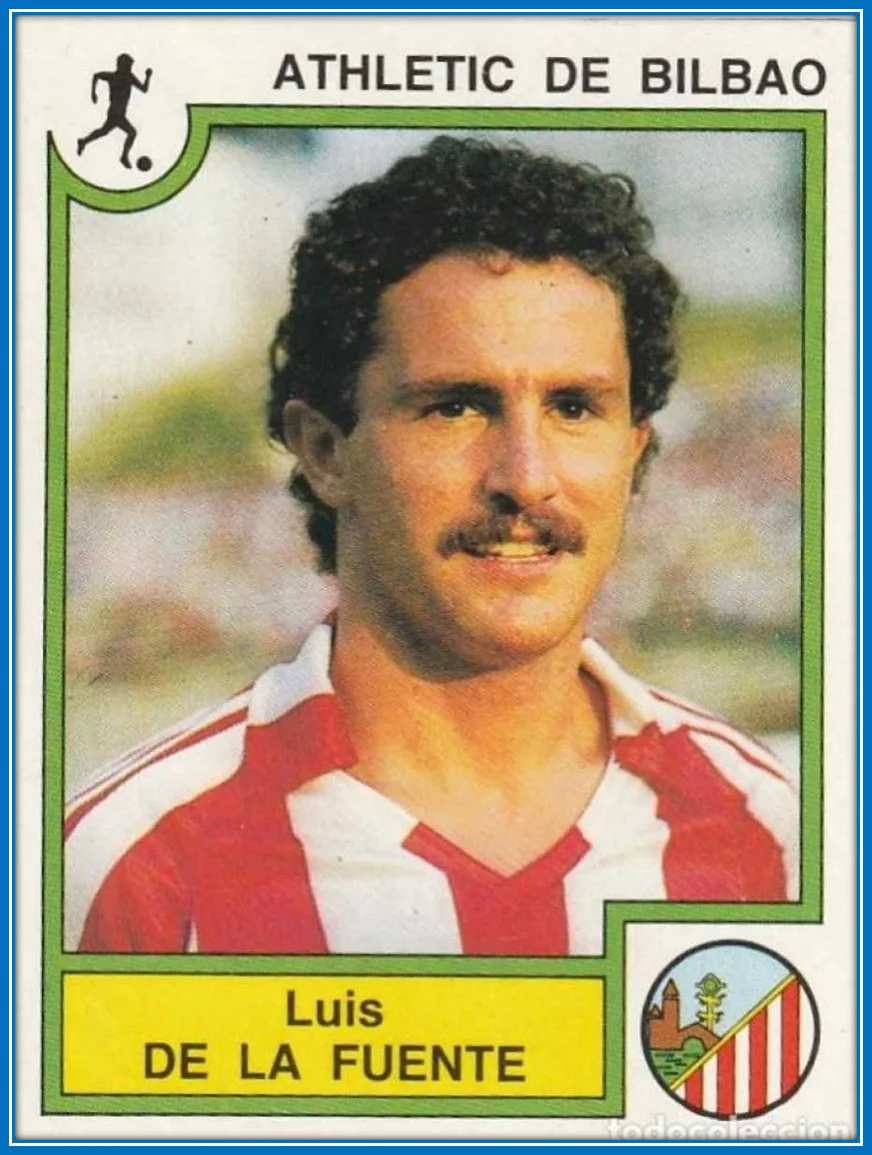
He debuted as a professional footballer at Athletic Bilbao, playing as a left-back. Credit: RTVE.
Subsequently, in July 1987, he joined Sevilla FC, another top-flight club, and continued to play regularly. De la Fuente played 78 games as a footballer for Sevilla and scored four goals. He was most consistent in his first season, playing 32 games.
In later seasons, his role was less prominent, partly because Manolo Jimenez was also competing for the same position. In 1991, he returned to Athletic Bilbao but didn’t get to play much.
Finally, in 1993, he joined Deportivo Alaves, a team in the third-tier league. After one season there, he decided to retire from professional soccer at the age of 33.
Luis de la Fuente Bio – Road to Fame Story:
During his playing career, he tasted success, winning two league titles, a Copa del Rey and a Super Cup. Notably, he was a crucial figure in the team that clinched the last two league titles in the club’s history under the management of Javier Clemente.
As a player, the Soccer Boss represented his country in various capacities. De la Fuente participated in Spain U18 (1978–1979), Spain U21 (1982–1984) and Spain Olympic in 1988.
De la Fuente’s presence was particularly influential in the defensive line, where he displayed his skills and authority in the centre of the defence.
However, his versatility allowed him to contribute effectively in various positions in the backline, showcasing his adaptability and commitment to the team’s success. With his playing career behind him, he transitioned to a coaching role.
He began his coaching journey with the Sevilla FC youth team. He later returned to Lezama to take charge of the Bilbao Athletic Club, serving in two separate stints, with a brief interlude as a delegate for the first team.
His next coaching adventure led him to Alavés, where he took the helm for a season. Unfortunately, his tenure at Alavés didn’t go as planned, and the club’s leadership decided to part ways with the legendary Spanish former football player.
Nevertheless, he continues to get highly respected in Spanish football, and his hometown even hosts a tournament in his honour, a testament to his well-deserved recognition and legacy in the sport.
Luis de la Fuente Biography – Rise to Fame Story:
The Spanish football manager, Castillo, has had a successful career in international football management. He has achieved notable success with various national teams. Those achievements showed his leadership and tactical skills.
Under his guidance, the under-19 Spanish team won the 2015 UEFA European Championship in Greece. Marco Asensio was one of the top goal-scorers. Furthermore, Luis took charge of the Spain under-21 team in July 2018 following Albert Celades’ resignation.
During his tenure as the under-21 manager, De la Fuente led the team to victory in the 2019 European Championship. See the limelight of the match following.
His team won the Championship after a hard-fought final against Germany. Thus showing De la Fuente’s ability to strategize and motivate his players to achieve success internationally.
Additionally, the Soccer Boss made history when he and his team filled in as the Spain senior side for a UEFA Euro 2020 friendly.
In this friendly match, de la Fuente’s team displayed talent and dominance, securing a confident 4-0 victory in Leganés. The dominance of Luis de la Fuente as football manager can speak through his achievements with the national teams he has coached.
His achievements with the Spain under-19 and under-21 teams demonstrate his ability to inspire young players. He assists them to reach their full potential. This success has also earned him recognition at the senior level.
Coaching career – Spain senior:
On the 8th day of December 2022, Luis de la Fuente was named the head coach of the senior national soccer team.
He replaced the previous coach, Luis Enrique, who stepped down after Morocco eliminated the team in a penalty shootout during the 2022 FIFA World Cup.
De la Fuente signed a contract that would last from the first January of 2023 until the UEFA Euro 2024, with the possibility of an extension.
Under his leadership, Spain won the 2022-23 UEFA Nations League. It was a first-time achievement, defeating Croatia 5-4 in a penalty shootout in Rotterdam. Then, on the 15th of October, 2023, he successfully guided the Spanish national team to qualify for the UEFA Euro 2024 through a qualification match against Norway.
Luis de la Fuente has skillfully integrated highly talented and young players into the Spanish national team, including Nico Williams, a Rising Alex Baena, Wonderkid Lamine Yamal, and Pedri, earning the admiration of fans. Spanish supporters are hopeful that he will be the guiding force behind Spain’s potential victory at EURO 2024. As the saying goes, the rest is history.
Is Luis de la Fuente single?:
The Spanish national team Head Coach has dedicated his entire life to the foot sport, first as a player and then as a coach. Now, at over 60 years old, he faces the most crucial sporting challenge of his career; which is the senior team.
A great responsibility that places him in the media spotlight and that also generates excellent interest around him, especially concerning his relationship.
For the records, the technical sportsman is not single but married with children. He is married to an Andalusian woman from Camas, and together they have three children. One of them, Alberto, has followed in his footsteps.
More about Luis de la Fuente’s Son – Alberto de la Fuente:
Notably, his family’s connection to football extends beyond his career. Alberto de la Fuente is neither a player nor a coach, but his professional life closely links to football, and he also works on the pitch.
He is an analyst for the youth teams of the Spanish soccer team and has been responsible for methodology and analysis for SD Huesca. In an interview in 2019, the new Spanish U-21 coach spoke about his son in El Diario del Alto Aragón.
“He knows much more than me, he is much more prepared, he is outstanding, and it is a pleasure to see young people with the concern they have, with the preparations, with the follow-up they do to football”.
Alberto de la Fuente has been a significant part of Luis’s personal life, providing support and companionship throughout his football player and manager journey.
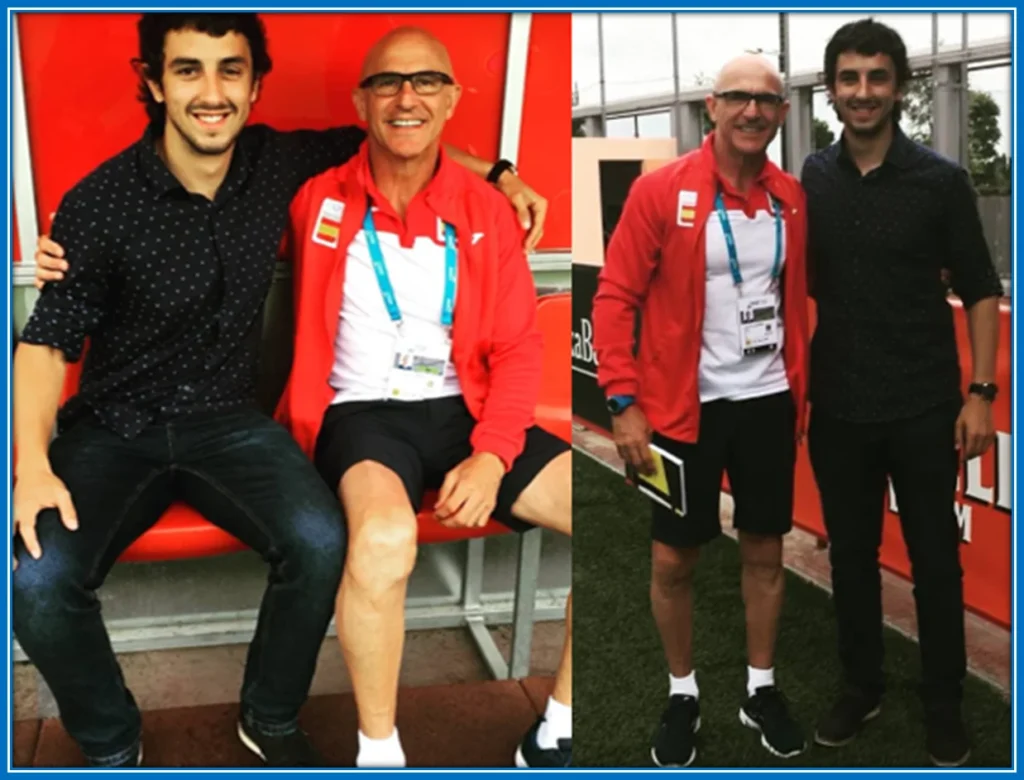
A Collage of Luis de la Fuente and his son, Alberto de la Fuente. Credit: Instagram/luisdelaafuente/
Luis de la Fuente Personal Life:
His Son, Alberto, described him as determined, disciplined, calm and discreet. In stark contrast, it is evident to note contemporary players for their dyed hair, extravagant fashion choices. Sometimes, even starring in advertisements dressed as cowboys.
These modern trends can sometimes appear frivolous. Good enough, after retiring as a player, De la Fuente underwent a significant transformation in both his life and appearance. He adopted a distinct look by shaving all the hair on his head, except for his eyebrows, ear, and nose hairs.
The gesture was contrary to the Curls and moustache during his time as a player. He now maintains a Manicured Mustache and a Clean Shaven on the Rest of His Face, giving him a professional appearance.
So far, he is a respected citizen and is described as a good citizen, which suggests that he respects the law and potentially engages in civic duties. Being a family man signifies that he values his family above all else and takes his responsibilities towards them seriously.
This label indicates that he likely prioritizes his role as a parent and cares deeply for his children. Just like anyone else, football players have things they enjoy doing outside of the sport.
Hobbies and Interests:
Spanish cuisine, including regional dishes, is a significant part of his life. Luis savours the traditional Spanish dishes. He, as well enjoys the local gastronomic specialities. The famous La Rioja wines often accompany them.
One can often learn about Luis’s hobbies, lifestyle, and leisure activities from social media posts and interviews. Emphatically, Football remains his passion. In addition, the talented Spaniard loves to spend quality time with his friends and family.
His activities include vacations, outings with friends, and attending special events. He often prioritizes rest and recovery to support his performances on the field. Luis de la Fuente ensures balanced nutrition in living a healthy.
As much as Luis de la Fuente has many fans, he is inactive on social media. Nonetheless, he has a few notable friends who think of him as a football zealot and one that has no life. Undoubtedly, football remains his primary passion.
Luis de la Fuente Zodiac:
Individuals born from the 21st of June to the 22nd of July have the sun sign of Cancer. The retired competitive soccer footballer and head coach falls into this category. Another football manager who fall into the same Cancer Zodiac sign is Roberto Martinez.
Cancers are known for being caring, loyal, and protective of their loved ones. They may seem reserved but have inner strength and can take action when needed. The symbol of the crab helps explain how Cancers can sense things even when they can’t explain why.
Luis de la Fuente Lifestyle:
As a professional football player and athlete, Luis de la Fuente possesses a disciplined lifestyle. His rigorous training, skill development, childhood experiences, and tactical preparations have significantly shaped his approach to the sport.
The Sports Tutor is a highly promising and successful Spanish sportsman and his achievements have allowed him to accumulate significant wealth from his hard work. Due to his impact and success, he has seen a substantial increase in his income.
This wealth enables him to enjoy a luxurious lifestyle, including lavish mansions, vacations, fine dining, and luxury cars.
The dynamic athlete lives a luxurious life between Madrid and Bilbao, close to Ereaga Beach, where he has developed a taste for expensive cars. His garage likely contains an
impressive collection of luxury vehicles.
Luis de la Fuente’s Family Life:
Overall, the Soccer Leader’s household, including his father, mother, and sister, provided a supportive and grounded foundation for his life. His network of family members has contributed to his football journey. Thus, let us take a look at them individually.
Luis de la Fuente’s Father – Alberto de la Fuente Senior:
Luis’s father, Alberto, was a key figure in his life. Alberto worked as a merchant marine, and he shared his passion for soccer with his son. He regularly took Luis to Bilbao to support Athletic Bilbao, instilling in him a profound connection to the sport.
This early exposure to soccer through his father’s guidance paved the way for Luis’s journey as a professional player.
While not extensively mentioned in the provided information, Alberto’s influence on Luis’s soccer career is evident. Good enough, he gave one of his children the same name his father bears.
Luis de la Fuente’s Mother – Berta Castillo:
Berta Castillo is Luis de la Fuente’s biological mother and the wife of Alberto de la Fuente Senior. While growing up, the confident Spanish Soccer Boss had a special connection with his family, and their presence and support were vital to his development as a player.
However, de la Fuente focuses on his professional career and prefers to keep his personal life private. Understandably, they may want to maintain their privacy and separate their personal lives from their professional careers.
Berta Castillo ran a haberdashery in Plaza de la Paz in Haro. Though her role in his life is unclear in the text, the presence of a family business suggests she may have played a part in instilling values of hard work and dedication in her son.
Luis de la Fuente Siblings – Ana de la Fuente:
Growing up with siblings can create many shared memories and experiences. It can also help footballers learn similar values and feel a sense of belonging.
Luis had a sister named Ana de la Fuente. While the text doesn’t delve deeply into her life, it mentions that she continued with the family business, transforming it into a boutique.
Luis de la Fuente Relatives:
Similarly, the sports boss has kept details about his extended family members relatively private. The aim is to shield his loved ones from unnecessary public scrutiny.
These relatives and close family friends played a significant role in his upbringing by offering support and guidance.
Without specific information about Luis de la Fuente’s relatives, like most Spaniards, the relationship between family members is crucial.
Consequently, the competitive athlete has Aunts, Uncles, grandparents, Cousins, Nephews, nieces, and possibly in-laws. But then, only a little is written about them.
Untold Facts:
In the final section of the global soccer instructor, Luis de la Fuente’s bio, we’ll unveil more truths you might need to learn about the Spanish head coach. So, without further ado, let’s begin.
Luis de la Fuente’s Salary:
The Gamester’s income source is mainly from being a successful Player. His net worth has been growing significantly. As a Spain head coach, Luis will receive €1,150,000 per annum, according to Playerwiki.
Due to his low-key nature, we could not express more about his financial matters. Consequently, he earns a little lower than his predecessor Luis Enrique, who, according to sportspayout, earned about £3 million per annum.
Luis de la Fuente Religion:
His beliefs likely play a central role in his life and influence his values and behaviours. Based on his religious beliefs, he gets described as an “Apostolic and Roman Catholic.”
Emphatically, meaning that he follows the Roman Catholic faith, which is one of the most significant and most widespread Christian denominations.
Being apostolic suggests a commitment to the teachings and traditions of the Apostolic Church, which often aligns with Roman Catholicism.
The Rubiales affair:
It all started when Luis Rubiales, who initially appointed De la Fuente as Spain’s coach, had to leave because of a situation with Jennifer Hermoso at the Women’s World Cup final. The problem with Rubiales was one of many issues.
Even before the Women’s World Cup, 15 players left the team to protest against their previous coach, Jorge Vilda. De la Fuente surprised many by expressing his support for Vilda, saying, “I want to support Jorge Vilda and encourage him.”
After winning the World Cup and an incident involving an unwelcome kiss, De la Fuente was photographed standing next to Rubiales, giving him a standing ovation as Rubiales declared he wouldn’t resign, despite controversy. This drew much attention from the media.
It led to action from the Spanish government and FIFA to remove Rubiales from his position. A few days later, De la Fuente released a statement, saying he didn’t expect the situation and wouldn’t have done the same if he could return in time.
Now, De la Fuente is also facing a legal trial as a witness. He’s still determining why he got called to court, but he’s willing to answer questions. His support within the Spanish Football Federation (RFEF) has dwindled.
Besides, if he makes another mistake, it could jeopardize Spain’s chances of qualifying for the European Championship. His coaching contract runs until the summer of 2024.
An interim board of the RFEF may keep him in place, but the next RFEF president will likely want to make changes. Elections for the RFEF president are expected in January 2024 or later. Thus, De la Fuente has few chances left to prove himself.
Challenges with the Spanish National Team:
De La Fuente can work with Sergio Busquets, Jordi Alba, and Sergio Ramos for the Spanish national team, but he’s open to talking to them about their future. He wants to know if they still want to play.
Managing these experienced players is his biggest challenge in his new job. While he was a good player in the past, he hasn’t coached in the top leagues.
When asked about this, he said that coaching a club team is different, and he believes he’s the right person for the national team. He got chosen over Marcelino, who had a successful club coaching career.
If De La Fuente doesn’t start well in the upcoming Nations League competition, he might face pressure, especially if Marcelino is available.
Right now, all he needs to do is not make the same mistakes as Luis Enrique to gain the confidence of the Spanish sports media. The Spaniard’s football manager has a short time to prove himself.
Summary EndNote:
Luis de la Fuente Castillo, born on June 21, 1961, is a Spanish football coach and used to be a professional football player. Like Alejandro Balde he once played the left-back position. He is currently in charge of the Spanish national soccer team.
De la Fuente started his football journey in the renowned Lezama school, known for developing young talent. He performed his professional debut with Athletic Bilbao in the 1980/81 season, marking the beginning of a remarkable seven-season stint with the club.
During his playing career, Luis played a total of 254 games in La Liga for Athletic Bilbao and Sevilla, scoring six goals. He won two league titles with Athletic Bilbao, and they also clinched the Copa del Rey in 1984.
Despite his impressive career, it’s interesting that he has yet to receive a senior national team call-up. However, he did represent various lower categories, including the Olympic team. After retiring as a player, Luis de la Fuente transitioned into coaching.
He began his coaching career with the Sevilla FC youth team. Afterwards, he returned to Lezama to manage the Bilbao Athletic Club, serving in two stints. He briefly took on the role of a delegate for the first team.
Luis guided the under-19 team to a victory in the 2015 European Championship and the under-21 team to the same success in 2019. He also coached the Olympic team that won a silver medal award in the Olympic Games of 2020.
In 2022, he took over as the head coach of the senior national team. Under his leadership, the team won the 2023 UEFA Nations League. In his personal life, he is married with three kids. One of his kids is Alberto, who follows in his career path.
Appreciation Note:
We take this moment to express sincere appreciation for reading our Biography of Luis de la Fuente, a Football Boss who is credited for the international rise of Lamine Yamal. Your interest and engagement mean a lot.
We are thrilled you found value in our continuous delivery of exciting European and Managerial football stories.
Luis de la Fuente’s Bio is part of our collection of Managerial Football Stories. If you have any further concerns about this memoir, please get in touch with us.
Aside from Luis de la Fuente’s Bio, we’ve got other excellent football manager stories for your reading pleasure. The Life Histories of Domenico Tedesco and Didier Deschamps will interest you.
